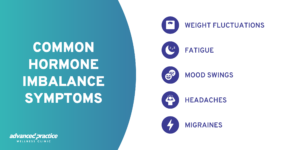While we often associate hormonal imbalances with events like monthly periods or menopause, it’s important to recognize that these imbalances can arise due to various factors. These include stress, lifestyle, diet, and underlying medical conditions. In fact, approximately 80% of women experience some form of hormonal imbalance at different stages of their lives.
The symptoms of a hormonal imbalance can vary as well. Hormonal imbalances are assumed to come with irregular, odd, or sudden-occurring symptoms, such as weight gain, acne, and mood swings. However, what if your everyday headache is a crucial clue that your body is experiencing underlying hormonal irregularities? Beyond the surface of discomfort, your headaches could mean a lot more than you thought they did.
Hormonal imbalances don’t just occur with a monthly period or menopause. Let’s take a look at hormone imbalance headaches, as well as other symptoms, and what you could gain from hormone therapy.
The Most Common Hormonal Imbalance Symptoms
Hormone balancing is essential for regulating most bodily functions. Too much or too little of any hormone can cause dysfunction and disease within the body. While a hormone imbalance isn’t necessarily easy to assess, there are some tell-tale signs that could potentially point to an imbalance of your hormones. Weight fluctuations, fatigue, and mood swings are the most notable hormone imbalance symptoms. However, be sure not to overlook those persistent headaches or migraines you might be experiencing.

- Weight Fluctuations: Does your weight fluctuate? Hormonal imbalances have an effect on your metabolism rate and appetite, which can contribute to unexplained weight gain or difficulty losing weight, often due to disruptions in insulin and thyroid hormones.
- Fatigue: Are you always tired? Hormones play a significant role in your sleep cycles and regulation of energy levels. Imbalances can lead to persistent fatigue, sleep deprivation, and low energy.
- Mood Swings: Do you experience mood swings or lack of motivation? Moodiness, anxiety, irritability, and depression are all universal symptoms in both men and women, related to imbalances in estrogen, progesterone, and testosterone levels.
- Headaches and Migraines: Fluctuations in hormones, especially estrogen, can trigger headaches or migraines in some individuals.
Headaches Caused by Hormonal Imbalances
- Hormone-Related Migraines: Some women experience migraines during other hormonal changes, such as ovulation or when taking hormonal birth control. These migraines are thought to be triggered by fluctuations in estrogen and other hormones. Nearly two out of three women who experience migraines correlate that their worst migraine attacks occur around the same time as their period. If you experience migraine attacks at the start, around two before your period, or during the first three days of your period, you likely have menstrual migraine. These attacks are often more severe and longer and cause greater light sensitivity than attacks occurring at other times of the month.
- Perimenopausal and Menopausal Migraines: As women approach menopause, their estrogen levels become more erratic. This can lead to an increased frequency of migraines or the onset of migraines in those who have never experienced them before. Perimenopause is referred to as the menopause transition or the months or years leading to menopause. During this time, hormonal fluctuations may trigger more migraine symptoms and attacks. Menopause is the natural end of menstrual cycles, occurring for most women between the ages of 45-55. Hormonal changes come with menopause, and hormonal fluctuations often play a big role in migraine attack frequency and severity. Headaches usually worsen as you approach menopause, partly because periods come more often and partly because the normal hormone cycle is disrupted.
- Estrogen Withdrawal Headaches: These headaches can occur when estrogen levels drop suddenly, such as during the placebo week of birth control pills or when discontinuing hormone therapy. They are believed to be a result of the brain’s reaction to the rapid change in hormone levels and can also be associated with other hormone withdrawal symptoms, including breast tenderness and pelvic pain. Estrogen withdrawal can also happen in women who are not taking hormonal contraception, as well as postmenopausal women who are taking estrogen-containing therapy.
Hormone Therapy Could be the Solution
It’s important to note that not all headaches or migraines are related to hormonal imbalances. Other factors like stress, diet, sleep patterns, and underlying medical conditions can also contribute to hormonal imbalance. If you’re experiencing frequent or severe headaches or migraines, especially if they coincide with hormonal changes, it’s recommended to consult a healthcare professional for proper diagnosis and management.
At Advanced Practice Clinic in Joplin, Missouri, our trained medical professionals specialize in hormone health, and we offer the best hormone therapy options the four states area has to offer. Our hormone imbalance checker can help you assess what issues you might be experiencing. Don’t wait to get your hormones in check. Start feeling better today.
Are you ready to take back your health?
Take the leap and schedule your appointment with us today!
SCHEDULE MY APPOINTMENT

